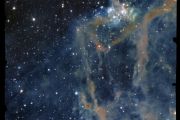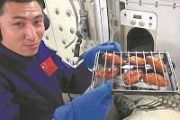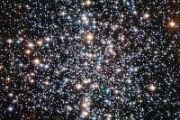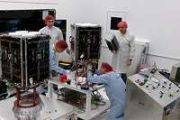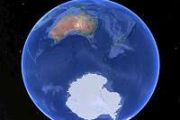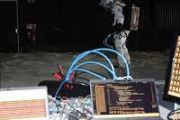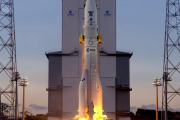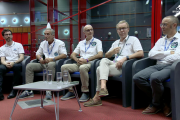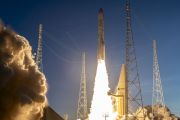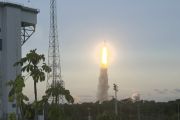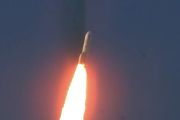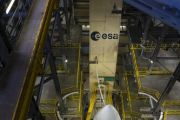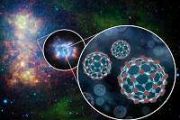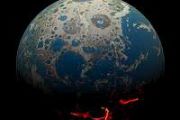
Copernical Team
Kibo | Space Station 360 (in French with English subtitles available)
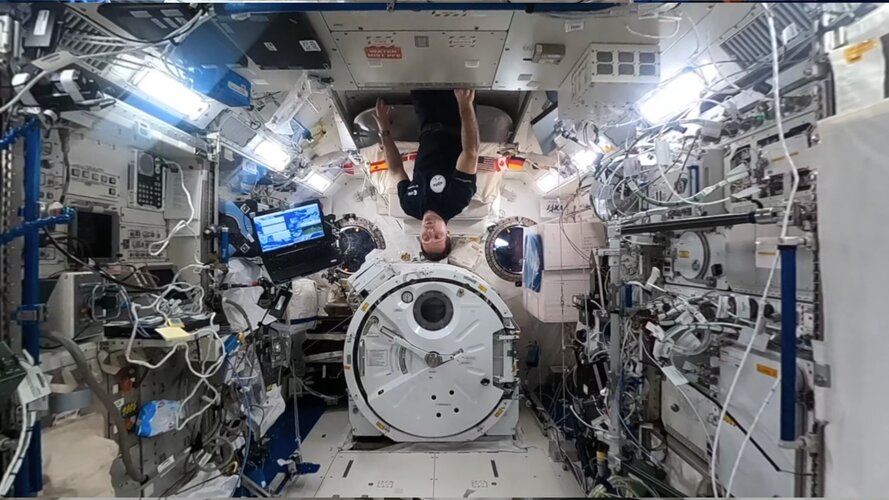 Video:
00:02:59
Video:
00:02:59
ESA astronaut Thomas Pesquet takes you on a tour of the International Space Station like no other. Filmed with a 360 camera, the Space Station 360 series lets you explore for yourself alongside Thomas’s explanation – this is the Kibo module.
Kibo is the Japanese module, also known as the Japanese Experiment Module or JEM. Thomas takes you through the hardware available for the astronauts and researchers on Earth and the unique airlock and storage space in Kibo.
The video is part of a series with Thomas showing each module in full 360 surround video.
Click and drag with your
Cosmic concrete developed from space dust and astronaut blood
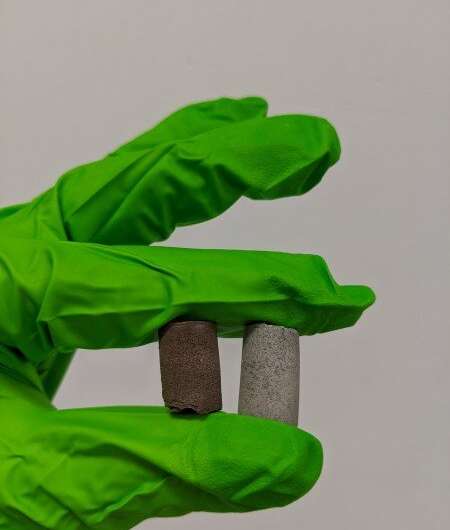
Transporting a single brick to Mars can cost more than a million British pounds—making the future construction of a Martian colony seem prohibitively expensive. Scientists at The University of Manchester have now developed a way to potentially overcome this problem, by creating a concrete-like material made of extra-terrestrial dust along with the blood, sweat and tears of astronauts.
In their study, published today in Materials Today Bio, a protein from human blood, combined with a compound from urine, sweat or tears, could glue together simulated moon or Mars soil to produce a material stronger than ordinary concrete, perfectly suited for construction work in extra-terrestrial environments.
The cost of transporting a single brick to Mars has been estimated at about US$2 million, meaning future Martian colonists cannot bring their building materials with them, but will have to utilize resources they can obtain on-site for construction and shelter. This is known as in-situ resource utilization (or ISRU) and typically focusses on the use of loose rock and Martian soil (known as regolith) and sparse water deposits.
Toward better space health: Understanding the effects of microgravity on P-glycoprotein

Deep space is most likely going to be humanity's final frontier, and space travel will undoubtedly become much more common in the future. However, space is a very hostile environment not only because of the technical difficulties that entail going there, but also because of the detrimental effects that constant microgravity has on the human body. Some examples of these are bone loss, muscle atrophy, and liver and kidney problems, as well as space motion sickness.
It should come as no surprise that astronauts resort to various drugs to ameliorate the symptoms caused by microgravity. Unfortunately for them, microgravity has been noted to have a significant impact on the pharmacokinetics of certain drugs, which could lead to altered efficacy and unexpected outcomes. In particular, delivering an accurate amount of a drug to the brain has become a key problem in space health.
In a recent effort to shed some light onto this issue, a team of scientists from Beijing Institute of Technology, China, studied the effects that microgravity has on P-glycoprotein (P-gp), an important efflux transporter. Their results are detailed in their paper published in Space: Science and Technology, on 17 Jun 2021.
SpaceX Inspiration4 mission will send four people with minimal training into orbit
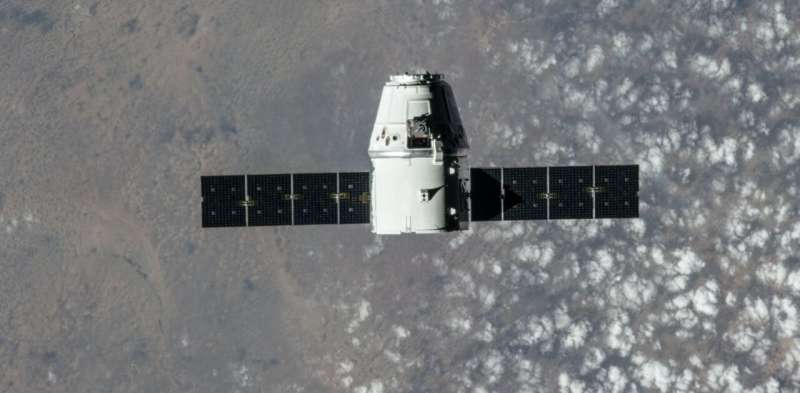
On Sept. 15, 2021, the next batch of space tourists are set to lift off aboard a SpaceX rocket. Organized and funded by entrepreneur Jared Isaacman, the Inspiration4 mission touts itself as "the first all-civilian mission to orbit" and represents a new type of space tourism.
The four crew members will not be the first space tourists this year. In the past few months, the world witnessed billionaires Richard Branson and Jeff Bezos launching themselves and a lucky few others into space on brief suborbital trips.
A billionaire, a cancer survivor... Who will be on the next SpaceX mission?
 For the first time on Wednesday, SpaceX is due to send into orbit a crew made up entirely of complete novices, without a professional astronaut on board.
The four passengers are supposed to embody the opening-up of space to everyone, giving the mission its name: Inspiration4.
A billionaire, Jared Isaacman, is behind the project. It was he who chartered the mission, at his own expense,
For the first time on Wednesday, SpaceX is due to send into orbit a crew made up entirely of complete novices, without a professional astronaut on board.
The four passengers are supposed to embody the opening-up of space to everyone, giving the mission its name: Inspiration4.
A billionaire, Jared Isaacman, is behind the project. It was he who chartered the mission, at his own expense, Space tourism: What's on offer
 A few minutes of weightlessness, or a few days. A short hop above the Earth's atmosphere, or a journey to the Moon and back... the era of space tourism is upon us, and - for those who can pay - it comes with many options.
This year has been an important one for the up-and-coming sector, with a slew of new missions announced. Here is the state of play.
- SpaceX -
1/ INSPIRATION4
A few minutes of weightlessness, or a few days. A short hop above the Earth's atmosphere, or a journey to the Moon and back... the era of space tourism is upon us, and - for those who can pay - it comes with many options.
This year has been an important one for the up-and-coming sector, with a slew of new missions announced. Here is the state of play.
- SpaceX -
1/ INSPIRATION4 SpaceX to launch private, all-civilian crew into Earth orbit
 SpaceX is set to launch four people into space Wednesday on a three-day mission that is the first to orbit the Earth with exclusively private citizens on board, as Elon Musk's company enters the space tourism fray.
The "Inspiration4" mission caps a summer that saw billionaires Richard Branson and Jeff Bezos cross the final frontier, on Virgin Galactic and Blue Origin spaceships respectively
SpaceX is set to launch four people into space Wednesday on a three-day mission that is the first to orbit the Earth with exclusively private citizens on board, as Elon Musk's company enters the space tourism fray.
The "Inspiration4" mission caps a summer that saw billionaires Richard Branson and Jeff Bezos cross the final frontier, on Virgin Galactic and Blue Origin spaceships respectively France to boost cyber warfare force
 The French defence ministry on Wednesday announced plans to significantly boost the country's four-year-old cyber warfare force, citing the "growing number and gravity" of hacking attacks on the country.
The government had already planned to add an additional 1,100 recruits to a unit created in response to the growing number of cyber attacks on the West, mostly blamed on Russia and China.
The French defence ministry on Wednesday announced plans to significantly boost the country's four-year-old cyber warfare force, citing the "growing number and gravity" of hacking attacks on the country.
The government had already planned to add an additional 1,100 recruits to a unit created in response to the growing number of cyber attacks on the West, mostly blamed on Russia and China. It's time for Australia to develop its own guided missiles
 Step by step, Australia is inching its way towards more autonomy in defence.
On Wednesday, Defence Minister Peter Dutton was reported to have signalled greater access to US missile technology will be a key test of the US-Australia alliance at a closed meeting of the American Chamber of Commerce in Australia.
In March Prime Minister Scott Morrison announced the defence department woul
Step by step, Australia is inching its way towards more autonomy in defence.
On Wednesday, Defence Minister Peter Dutton was reported to have signalled greater access to US missile technology will be a key test of the US-Australia alliance at a closed meeting of the American Chamber of Commerce in Australia.
In March Prime Minister Scott Morrison announced the defence department woul Northrop Grumman demonstrates connectivity for long range command and control
 Northrop Grumman Corporation has successfully demonstrated a data link for connecting aircraft in highly contested airspace for long-range command and control through an open architecture network. This experiment is a critical milestone in the evolution of a distributed multi-domain battle management command and control architecture that maintains decision superiority for the U.S. military and a
Northrop Grumman Corporation has successfully demonstrated a data link for connecting aircraft in highly contested airspace for long-range command and control through an open architecture network. This experiment is a critical milestone in the evolution of a distributed multi-domain battle management command and control architecture that maintains decision superiority for the U.S. military and a 



